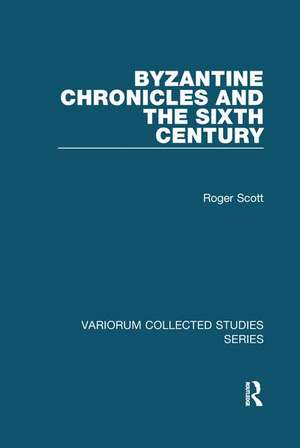Byzantine Chronicles and the Sixth Century: Variorum Collected Studies
Autor Roger Scotten Limba Engleză Paperback – 22 mai 2017
Din seria Variorum Collected Studies
-
 Preț: 311.18 lei
Preț: 311.18 lei -
 Preț: 310.55 lei
Preț: 310.55 lei -
 Preț: 299.55 lei
Preț: 299.55 lei - 9%
 Preț: 1041.23 lei
Preț: 1041.23 lei -
 Preț: 386.77 lei
Preț: 386.77 lei -
 Preț: 351.48 lei
Preț: 351.48 lei -
 Preț: 313.38 lei
Preț: 313.38 lei -
 Preț: 386.77 lei
Preț: 386.77 lei -
 Preț: 310.22 lei
Preț: 310.22 lei -
 Preț: 258.66 lei
Preț: 258.66 lei -
 Preț: 343.33 lei
Preț: 343.33 lei - 9%
 Preț: 938.44 lei
Preț: 938.44 lei -
 Preț: 311.41 lei
Preț: 311.41 lei - 9%
 Preț: 938.85 lei
Preț: 938.85 lei -
 Preț: 312.75 lei
Preț: 312.75 lei - 9%
 Preț: 936.60 lei
Preț: 936.60 lei -
 Preț: 341.55 lei
Preț: 341.55 lei -
 Preț: 320.00 lei
Preț: 320.00 lei - 34%
 Preț: 764.20 lei
Preț: 764.20 lei - 22%
 Preț: 312.43 lei
Preț: 312.43 lei - 34%
 Preț: 739.65 lei
Preț: 739.65 lei - 34%
 Preț: 764.20 lei
Preț: 764.20 lei - 34%
 Preț: 680.73 lei
Preț: 680.73 lei - 26%
 Preț: 247.40 lei
Preț: 247.40 lei - 34%
 Preț: 485.78 lei
Preț: 485.78 lei - 34%
 Preț: 764.20 lei
Preț: 764.20 lei - 34%
 Preț: 769.51 lei
Preț: 769.51 lei - 34%
 Preț: 764.20 lei
Preț: 764.20 lei - 34%
 Preț: 826.68 lei
Preț: 826.68 lei - 25%
 Preț: 222.32 lei
Preț: 222.32 lei - 25%
 Preț: 225.54 lei
Preț: 225.54 lei - 34%
 Preț: 767.07 lei
Preț: 767.07 lei - 34%
 Preț: 764.20 lei
Preț: 764.20 lei - 34%
 Preț: 736.38 lei
Preț: 736.38 lei - 34%
 Preț: 738.42 lei
Preț: 738.42 lei - 25%
 Preț: 226.52 lei
Preț: 226.52 lei - 33%
 Preț: 491.66 lei
Preț: 491.66 lei - 34%
 Preț: 485.78 lei
Preț: 485.78 lei - 34%
 Preț: 485.78 lei
Preț: 485.78 lei - 34%
 Preț: 764.20 lei
Preț: 764.20 lei - 34%
 Preț: 736.38 lei
Preț: 736.38 lei - 31%
 Preț: 473.94 lei
Preț: 473.94 lei - 18%
 Preț: 807.71 lei
Preț: 807.71 lei - 34%
 Preț: 764.20 lei
Preț: 764.20 lei - 34%
 Preț: 764.20 lei
Preț: 764.20 lei - 34%
 Preț: 764.20 lei
Preț: 764.20 lei - 51%
 Preț: 485.78 lei
Preț: 485.78 lei - 34%
 Preț: 485.78 lei
Preț: 485.78 lei - 34%
 Preț: 769.10 lei
Preț: 769.10 lei - 34%
 Preț: 766.65 lei
Preț: 766.65 lei
Preț: 325.34 lei
Preț vechi: 371.71 lei
-12% Nou
Puncte Express: 488
Preț estimativ în valută:
62.26€ • 64.63$ • 51.92£
62.26€ • 64.63$ • 51.92£
Carte tipărită la comandă
Livrare economică 24 martie-07 aprilie
Preluare comenzi: 021 569.72.76
Specificații
ISBN-13: 9781138109261
ISBN-10: 1138109266
Pagini: 352
Dimensiuni: 152 x 229 mm
Greutate: 0.45 kg
Ediția:1
Editura: Taylor & Francis
Colecția Routledge
Seria Variorum Collected Studies
Locul publicării:Oxford, United Kingdom
ISBN-10: 1138109266
Pagini: 352
Dimensiuni: 152 x 229 mm
Greutate: 0.45 kg
Ediția:1
Editura: Taylor & Francis
Colecția Routledge
Seria Variorum Collected Studies
Locul publicării:Oxford, United Kingdom
Cuprins
Contents: Preface; Part A Historiography, Chronicles and the 6th Century: Byzantine chronicles; Byzantium in the 6th century and the beginning of Byzantine historical writing; The classical tradition in Byzantine historiography; Text and context in Byzantine historiography; Towards a new history of Byzantine literature: the case of historiography (with Ingela Nilsson); Chronicles versus classicizing history: Justinian's West and East. Part B Malalas, Theophanes and the 6th Century: Malalas and his contemporaries; Malalas and Justinian's codification; Malalas, The Secret History and Justinian's propaganda; John Lydus on some procedural changes; Diplomacy in the 6th century: the evidence of John Malalas; 'The events of every year arranged without confusion': Justinian and others in the chronicle of Theophanes Confessor; Writing the reign of Justinian: Malalas versus Theophanes. Part C Malalas, Theophanes and Their Byzantine Past: Malalas' view of the classical past; The image of Constantine in Malalas and Theophanes; From propaganda to history to literature: the Byzantine stories of Theodosius' apple and Marcian's eagles. Part D Reinterpreting the 5th and 6th Centuries: Narrating Justinian: from Malalas to Manasses; Interpreting the late 5th and early 6th centuries from Byzantine chronicle trivia; Justinian's new age and the Second Coming; Index.
Notă biografică
Roger Scott is a Principal Fellow in the Department of Classics and Archaeology, University of Melbourne, Australia.
Recenzii
'By attempting to draw our intention to the nuances and complexity of seemingly straightforward, plagiarism-filled chronicles in this book and throughout his career, Scott has done the study of late antique historiography a great service.' Bryn Mawr Classical Review
Descriere
Byzantine chronicles have traditionally been regarded as a somewhat inferior form of Byzantine history writing, especially in comparison with 'classicizing' historians. The aim of these papers is both to rescue the reputation of the Byzantine chroniclers, especially Malalas and Theophanes, and to provide examples of how such chroniclers can be exploited not only to reveal aspects of the past itself, but also of how the Byzantines interpreted their own past, including on occasions rewriting that past to suit contemporary needs. By considering more general aspects of the place of history-writing in Byzantine culture, the papers also explain why history remained such an important aspect of Byzantine culture.
